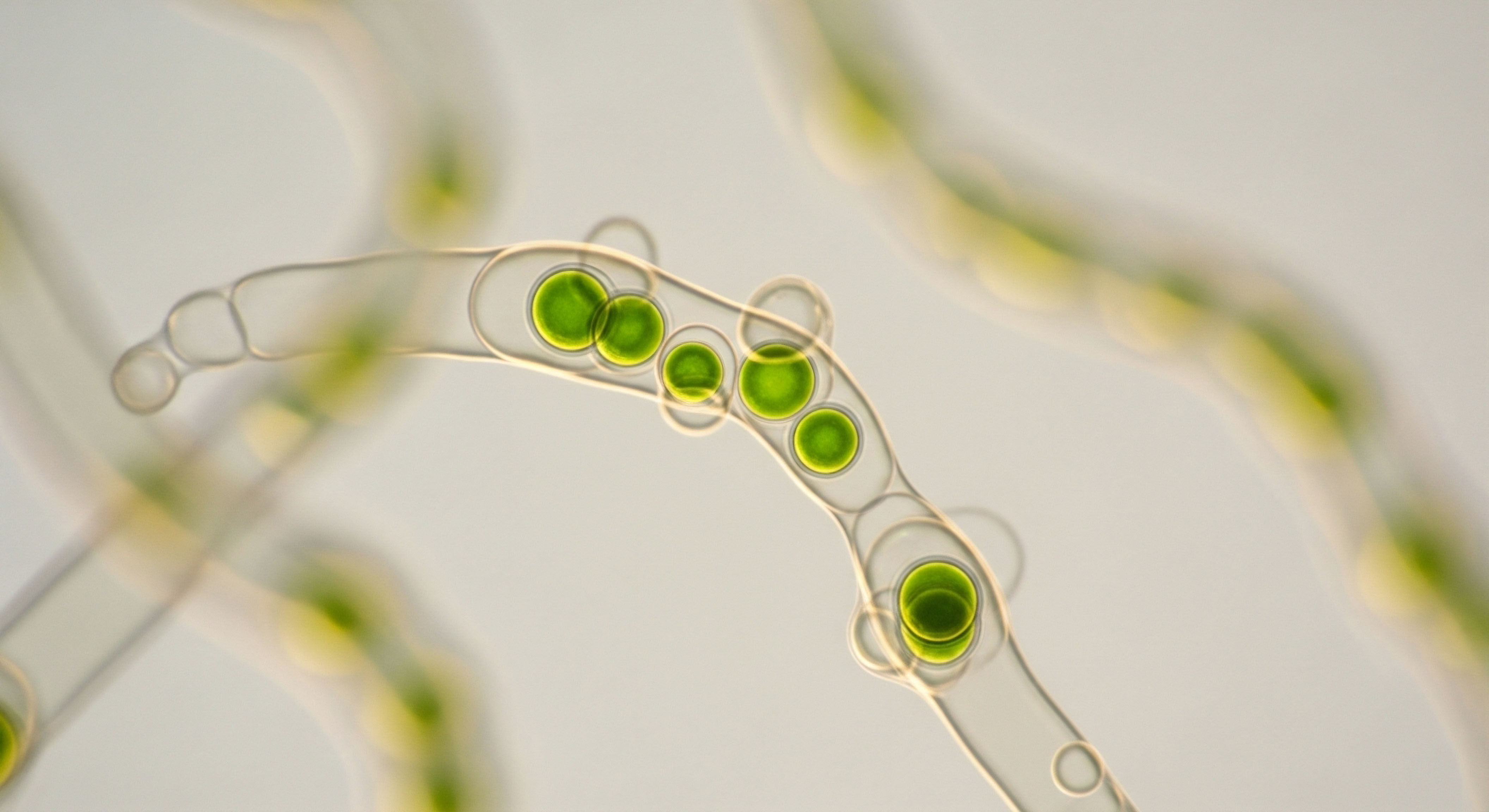

Fundamentals
Your body is a meticulously orchestrated system of communication. Hormones act as molecular messengers, carrying vital instructions from glands to tissues, directing everything from your energy levels and mood to your metabolic rate and reproductive health. When you embark on a hormonal optimization protocol, you are introducing a powerful, precise signal intended to restore balance and function.
The question of whether lifestyle factors can undermine this process is a valid and perceptive one. The answer is a definitive yes. Your daily choices regarding what you eat and how you manage stress create the physiological environment in which these hormonal signals must operate. A system flooded with inflammatory signals from a highly processed diet or overwhelmed by the constant alert state of chronic stress can become deaf to the very messages designed to help it heal.
Think of your endocrine system as a sophisticated postal service. Hormonal therapies are like priority packages, sent with clear instructions. Chronic stress, however, acts like a city-wide emergency lockdown. It releases a flood of cortisol, the body’s primary stress hormone, which effectively shuts down non-essential services to deal with a perceived threat.
This includes disrupting the delicate hypothalamic-pituitary-gonadal (HPG) axis, the command-and-control pathway for reproductive hormones like testosterone. Cortisol can suppress the signals that tell the testes or ovaries to function, effectively working against the very therapy you are using. Similarly, a diet high in refined sugars and processed fats triggers metabolic chaos.
It forces the pancreas to pump out insulin, leading to fluctuations in blood sugar and, over time, a state of insulin resistance where cells no longer respond efficiently to insulin’s message. This metabolic noise interferes with the clear signal of hormone therapy, diminishing its intended effect.
A well-calibrated hormonal protocol operates within the biological environment you create daily through diet and stress management.
The experience of fatigue, mental fog, or a stalled sense of progress, even while on a protocol like Testosterone Replacement Therapy (TRT), is often a direct reflection of this internal conflict. You may be supplying the necessary testosterone, but the body’s cellular machinery is too overwhelmed by stress-induced cortisol or diet-driven inflammation to properly receive and utilize it.
This is why a holistic approach is so essential. The therapy itself is a key component, a critical tool for recalibration. Its full potential is only unlocked when supported by lifestyle choices that create a calm, receptive, and efficient internal environment. Addressing diet and stress is a foundational pillar of successful hormonal optimization, ensuring the messages of healing and balance are received loud and clear.


Intermediate
To comprehend how lifestyle choices can actively impede sophisticated hormonal therapies, we must examine the specific biochemical pathways involved. Hormonal optimization protocols, whether for male andropause or female perimenopause, are designed to re-establish physiological signaling. Yet, these signals are susceptible to interference from two of the most powerful modulators of human physiology ∞ the stress response system, governed by cortisol, and the metabolic system, primarily regulated by insulin.

The Cortisol-Testosterone Antagonism
Chronic stress creates a state of perpetually elevated cortisol. This has direct, suppressive effects on the Hypothalamic-Pituitary-Gonadal (HPG) axis, the very system that protocols like TRT aim to support. Cortisol can inhibit the release of Gonadotropin-Releasing Hormone (GnRH) from the hypothalamus.
Less GnRH means less Luteinizing Hormone (LH) and Follicle-Stimulating Hormone (FSH) are released from the pituitary. For a man on TRT who is also using Gonadorelin to maintain testicular function, high cortisol levels can directly counteract the therapy’s purpose. Gonadorelin is designed to mimic GnRH and stimulate the pituitary; however, a cortisol-saturated environment makes the entire axis less responsive.
Furthermore, cortisol promotes the activity of the aromatase enzyme. This enzyme converts testosterone into estrogen. For individuals on TRT, this means a portion of the therapeutic testosterone is being converted into estradiol, potentially leading to side effects like water retention and mood changes, and reducing the effective dose of testosterone. This is why Anastrozole, an aromatase inhibitor, is often included in protocols. Chronic stress can exacerbate the very issue Anastrozole is meant to control, creating a physiological tug-of-war.

How Can Diet Derail Hormonal Balance?
The modern Western diet, often high in refined carbohydrates and processed fats, presents a significant challenge to metabolic and hormonal health. A diet that consistently spikes blood glucose leads to hyperinsulinemia, or chronically high levels of insulin. This state has several consequences for hormonal optimization.
- Insulin Resistance ∞ Persistently high insulin leads to cells becoming less sensitive to its signal. This cellular resistance is a state of inflammation and metabolic dysfunction that can impair the function of hormone receptors on cell surfaces, making them less receptive to testosterone or other therapeutic hormones.
- SHBG Reduction ∞ High insulin levels can lower Sex Hormone-Binding Globulin (SHBG), a protein that carries testosterone in the bloodstream. While this might seem to increase “free” testosterone, the underlying metabolic chaos often negates any potential benefit.
- Inflammation ∞ Diets rich in processed foods promote systemic inflammation. Inflammatory cytokines can disrupt hormone signaling and contribute to the general feeling of malaise that hormonal therapies are intended to alleviate.
The effectiveness of exogenous hormones is directly tied to the sensitivity of cellular receptors, which is profoundly influenced by insulin and cortisol.
The table below illustrates how specific lifestyle factors can directly oppose the goals of a standard male hormonal optimization protocol.
| Therapeutic Agent | Intended Action | Lifestyle Antagonist (Stress/Diet) | Resulting Conflict |
|---|---|---|---|
| Testosterone Cypionate | Restore physiological testosterone levels for energy, libido, and well-being. | High cortisol from chronic stress. | Cortisol increases aromatase activity, converting testosterone to estrogen, and suppresses the HPG axis. |
| Gonadorelin | Stimulate the pituitary to produce LH/FSH, maintaining natural testicular function. | Elevated cortisol levels. | Cortisol suppresses the pituitary’s sensitivity to GnRH signals, dampening the effect of Gonadorelin. |
| Anastrozole | Inhibit the aromatase enzyme to control estrogen levels. | Poor diet and high stress. | Both factors can increase baseline aromatase activity, placing a greater burden on the medication. |
A successful outcome depends on a synergistic relationship between the therapeutic protocol and the patient’s lifestyle. Neglecting the foundational roles of nutrition and stress management creates a state of biological resistance that even the most precise clinical interventions struggle to overcome.


Academic
A granular analysis of lifestyle-mediated interference with hormonal therapies reveals a complex interplay at the level of cellular receptors, enzymatic activity, and intracellular signaling cascades. The prevailing clinical assumption is that providing an exogenous hormone will correct a deficiency. This view is incomplete.
The biological reality is that the efficacy of any hormonal agent is contingent upon the receptivity of the target tissue, a state profoundly modulated by the metabolic and neuroendocrine environment. Chronic psychological stress and dysregulated nutrition can induce a state of functional hormone resistance, rendering even well-designed protocols less effective.

Glucocorticoid-Induced Attenuation of Androgen Signaling
At a molecular level, chronic hypercortisolemia, the hallmark of unabated stress, initiates a cascade that actively degrades androgen signaling. The glucocorticoid receptor (GR) and the androgen receptor (AR) share structural similarities and can compete for shared transcriptional co-regulators.
When cortisol levels are persistently high, the activated GR can sequester these co-regulators, effectively reducing their availability for the AR complex. This diminishes the transcriptional efficiency of androgen-responsive genes, even when circulating testosterone levels are adequate. Essentially, the cellular machinery to execute testosterone’s commands is hijacked by the stress response.
Furthermore, elevated cortisol directly impacts gonadal steroidogenesis. It has been shown to suppress the expression of key enzymes in the testosterone synthesis pathway within testicular Leydig cells. For a patient on TRT with adjunctive therapies like Gonadorelin or Enclomiphene, which are intended to preserve endogenous production, this represents a direct biochemical antagonism. The therapeutic signal to produce testosterone is met with a cortisol-induced enzymatic blockade, blunting the intended outcome.

Metabolic Endotoxemia and Receptor Desensitization
A diet high in saturated fats and refined sugars does more than cause insulin resistance; it can induce a condition known as metabolic endotoxemia. This process involves the translocation of lipopolysaccharides (LPS) from the gut microbiome into circulation, triggering a low-grade, chronic inflammatory response mediated by Toll-like receptor 4 (TLR4). This systemic inflammation has profound implications for hormone sensitivity.
The resulting inflammatory cytokines, such as TNF-α and IL-6, are known to interfere with insulin signaling pathways (e.g. by phosphorylating IRS-1 at serine residues), but their effects extend to steroid hormone receptors. This inflammatory milieu can downregulate the expression of the androgen receptor and impair its translocation to the nucleus, a critical step for its function.
Therefore, a patient may have optimal levels of total and free testosterone in their serum, but the target cells are functionally deaf due to inflammation-induced receptor pathology.
The following table outlines the mechanistic pathways through which these lifestyle factors exert their negative influence, creating a state of acquired resistance to therapy.
| Influencing Factor | Biological Mechanism | Impact on Hormonal Protocol | Relevant Biomarkers |
|---|---|---|---|
| Chronic Stress | Sustained HPA axis activation leading to hypercortisolemia. | Suppresses GnRH/LH pulse, increases aromatase activity, and promotes GR/AR competition for co-regulators. | Salivary cortisol rhythm, DHEA-S, hs-CRP. |
| Poor Diet | Hyperinsulinemia and metabolic endotoxemia from high-glycemic, processed foods. | Induces insulin resistance, systemic inflammation (TNF-α, IL-6), and subsequent hormone receptor desensitization. | Fasting insulin, HOMA-IR, hs-CRP, triglycerides. |
| Sleep Deprivation | Disruption of circadian rhythm, leading to increased cortisol and decreased nocturnal testosterone production. | Directly elevates cortisol while blunting the therapeutic window for testosterone’s anabolic effects. | Cortisol, Testosterone (morning), sleep tracking data. |
What are the implications for clinical practice in China? As lifestyle-related metabolic diseases increase, clinicians must consider that hormonal optimization protocols may show variable efficacy based on a patient’s underlying metabolic health and stress levels, which can be culturally and environmentally influenced.
The clinical challenge is to move beyond simple hormone replacement and adopt a systems-biology approach. This involves quantifying and addressing the inflammatory and metabolic load carried by the patient. Failure to do so results in a frustrating cycle of escalating doses to overcome a resistance that is fundamentally lifestyle-driven. True optimization requires a dual strategy ∞ providing the necessary hormonal signal while concurrently clearing the metabolic and stress-induced static that prevents it from being heard.

References
- Taylor, S. I. “Mechanisms of hormone resistance ∞ lessons from insulin-resistant patients.” The Journal of Clinical Endocrinology & Metabolism, vol. 73, no. 5, 1991, pp. 943-8.
- Viau, V. “Functional cross-talk between the hypothalamic-pituitary-gonadal and -adrenal axes.” Journal of Neuroendocrinology, vol. 14, no. 6, 2002, pp. 506-13.
- Sherman, G. D. et al. “The Interaction of Testosterone and Cortisol Is Associated With Attained Status in Male Executives.” Social Psychological and Personality Science, vol. 7, no. 7, 2016, pp. 692-700.
- Whirledge, S. and Cidlowski, J. A. “Glucocorticoids, stress, and fertility.” Minerva endocrinologica, vol. 35, no. 2, 2010, pp. 109-25.
- Pitteloud, N. et al. “Relationship between testosterone levels, insulin sensitivity, and mitochondrial function in men.” Diabetes Care, vol. 28, no. 7, 2005, pp. 1636-42.

Reflection
The information presented here provides a biological framework for understanding your body’s intricate internal dialogue. The science confirms a truth many feel intuitively ∞ that our daily rituals of eating, sleeping, and responding to stress are not separate from our hormonal health but are fundamentally intertwined with it.
Viewing your hormonal optimization protocol as a partnership, one where the therapy provides a precise signal and your lifestyle cultivates a receptive environment, is the first step toward reclaiming your vitality. This knowledge is not a conclusion but an invitation. It prompts a deeper inquiry into your own unique physiology and the daily choices that shape it.
What is your body telling you through its symptoms and responses? Understanding the science is the tool; applying it to your personal context is the art of achieving true wellness.



